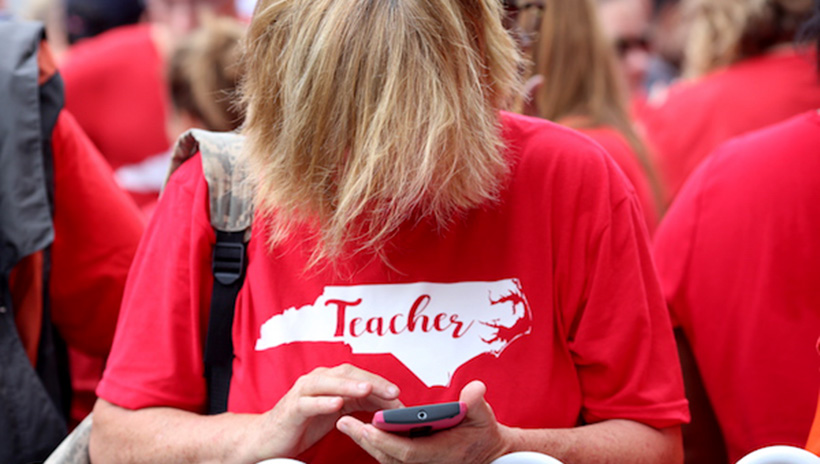Publisher's Note: This post appears here courtesy of the
Carolina Journal. The author of this post is
David N. Bass.
A participant in the May 2018 March for Students and Rally for Respect in downtown Raleigh. | Photo: Don Carrington / Carolina Journal
The N.C. Senate rolled out a budget proposal this week that would expand school choice across the state while raising teacher pay and seeking to remedy student learning losses due to closed classrooms because of the COVID-19 pandemic.
"There is nothing flashy about this education budget, which is precisely what we have come to expect from Senate budget writers," said Dr. Terry Stoops, director of the Center for Effective Education at the John Locke Foundation.
"As usual, Senate Republicans offer a moderate increase in the state education budget to support programs laser-focused on raising student achievement, expanding school choice, and addressing widely recognized needs in our schools."
In total, the budget proposal would spend $10.4 billion in 2021–22 and $10.5 billion in 2022–23 on K-12 public education. That amount includes a 3% raise for teachers over two years in addition to one-time bonuses of $300 and between $1,000 and $1,500 added bonuses from federal funds. Additionally, non-certified school employees would see their wages rise to a minimum wage of $13 per hour.
The budget also allocates $40.9 million each year to ensure that every school district has at least one school psychologist. And it
allocates $6 million to fund the Excellent Public Schools Act implementation meant to ensure students are reading proficiently by the third grade.
The budget also includes a significant expansion of the state's three school-choice scholarships aimed at low- and middle-income families and those with students with special needs.
Under the budget proposal, income eligibility for the Opportunity Scholarship Program would increase 175% of the amount to qualify for the federal free and reduced-price lunch program, meaning a family of four making $85,794 a year would qualify. The scholarship amount would increase from $4,200 a year to match 90% of the per-pupil allotment for students enrolled in public school during the prior fiscal year — around $5,800 per student.
The budget follows the wording of the
Senate version of a school-choice expansion bill that passed that chamber recently.
"It is important to note that the program is still more efficient for the state because there is a minimum 10% savings per student that utilizes the program," said Leah Byers, government affairs associate at the John Locke Foundation.
"If we can educate North Carolina students at a school of their choice while saving taxpayer money, it seems like a win-win."
Beyond the Opportunity Scholarship Program, the Senate budget would combine the Children with Disabilities Grant Program and Education Savings Account into one program to ensure adequate funding and reduce waitlists. Now, the disabilities grant and ESA program provide up to $8,000 and $9,000, respectively, for students with special needs to help defray the cost of tuition, specialized treatments and therapies, or equipment.
The level of pay raises for teachers drew fire from the N.C. Association of Educators, the state's arm of the national teacher's union.
"When presented with an added $6.5 billion in unexpected revenue, the Senate opted to reward educators for working non-stop to support students through the most difficult school year in history with a pitiful 1.5% raise," said NCAE president Tamika Kelly in a statement.
"Corporate tax cuts take priority over students yet again."
In a press conference in Tuesday, June 22, Senate leader Phil Berger, R-Rockingham, pointed out that North Carolina was lagging behind the region in teacher pay when the Republican majority took over in 2011. But it has since risen to second in the southeast in average teacher pay.
"Over the past two years, we made several attempts to provide larger raises. Those attempts were voted against by many of the Democrats — and certainly, Democrats voted against those raises when the governor vetoed those raises," Berger said.
"Our commitment is to make that our year-over-year spend is kept under control so we can keep the promises that have been made up to this point to the teachers, to the state employees, to the taxpayers of the state of North Carolina."
Dr. Bob Luebke, senior fellow for the Center for Effective Education at the John Locke Foundation, noted that there are other ways lawmakers can remedy learning losses.
"We'd like to see more outside the box thinking on how to address learning loss," said Luebke.
"ESAs offer parents a solid way to address the aftermath of COVID. We're hopeful that legislators will see ESAs as an investment that will pay dividends for years to come. That's what we continue to work toward."
























